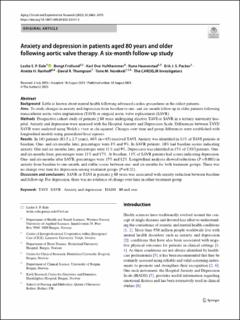Anxiety and depression in patients aged 80 years and older following aortic valve therapy. A six‑month follow‑up study
Eide, Leslie S.P.; Fridlund, Bengt Gotthard Anton; Hufthammer, Karl Ove; Haaverstad, Rune; Packer, Erik; Ranhoff, Anette Hylen; Thompson, David R; Norekvål, Tone Merete
Journal article, Peer reviewed
Published version

Åpne
Permanent lenke
https://hdl.handle.net/11250/3112686Utgivelsesdato
2023Metadata
Vis full innførselSamlinger
- Department of Clinical Science [2318]
- Registrations from Cristin [9791]
Originalversjon
Aging Clinical and Experimental Research. 2023, 35, 2463-2470. 10.1007/s40520-023-02541-5Sammendrag
Background
Little is known about mental health following advanced cardiac procedures in the oldest patients.
Aims
To study changes in anxiety and depression from baseline to one- and six-month follow-up in older patients following transcatheter aortic valve implantation (TAVI) or surgical aortic valve replacement (SAVR).
Methods
Prospective cohort study of patients ≥ 80 years undergoing elective TAVI or SAVR in a tertiary university hospital. Anxiety and depression were assessed with the Hospital Anxiety and Depression Scale. Differences between TAVI/SAVR were analyzed using Welch’s t test or chi-squared. Changes over time and group differences were established with longitudinal models using generalized least squares.
Results
In 143 patients (83.5 ± 2.7 years), 46% (n = 65) received TAVI. Anxiety was identified in 11% of TAVI patients at baseline. One- and six-months later, percentages were 8% and 9%. In SAVR patients, 18% had baseline scores indicating anxiety. One and six-months later, percentages were 11% and 9%. Depression was identified in 15% of TAVI patients. One- and six-months later, percentages were 11% and 17%. At baseline, 11% of SAVR patients had scores indicating depression. One- and six-months after SAVR, percentages were 15% and 12%. Longitudinal analyses showed reductions (P < 0.001) in anxiety from baseline to one-month, and stable scores between one- and six-months for both treatment groups. There was no change over time for depression among treatment groups (P = 0.21).
Discussion and conclusions
SAVR or TAVI in patients ≥ 80 years was associated with anxiety reduction between baseline and follow-up. For depression, there was no evidence of change over time in either treatment group.
